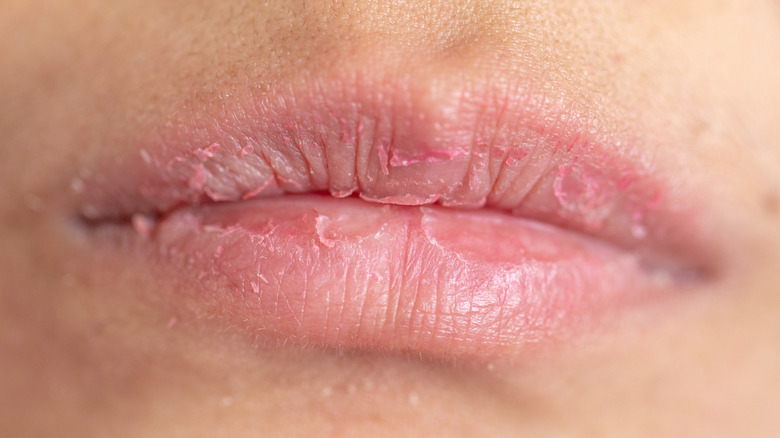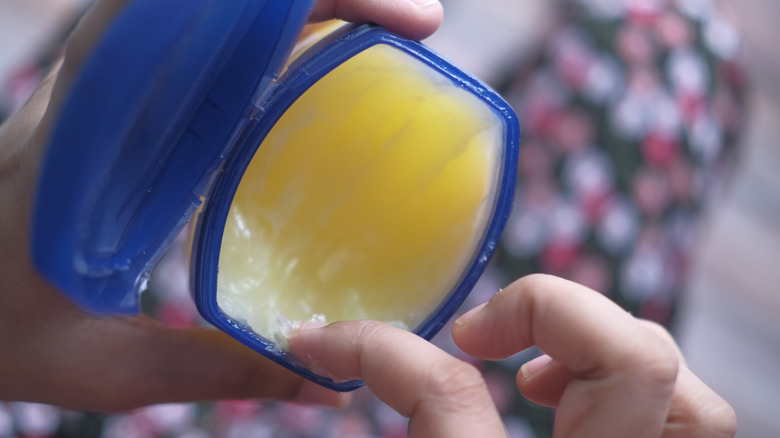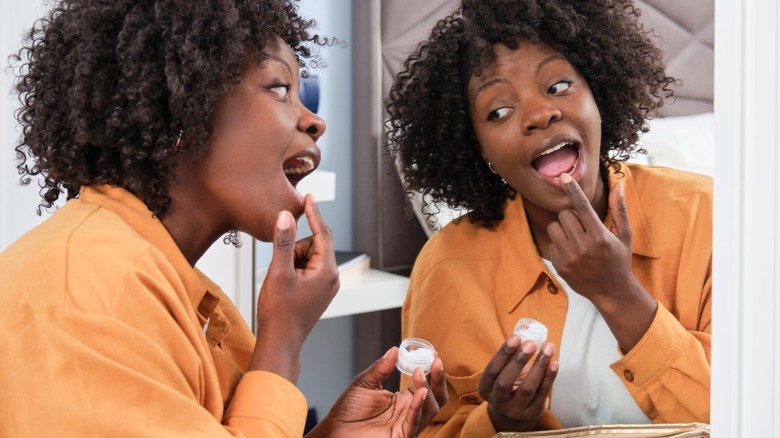The Products & Ingredients To Avoid If You Have Chapped Lips
The lips are one of the most sensitive parts of the human body. All you need is a day in the sun or out in the cold weather to experience how the elements negatively affect your lips. Even eating too much salt, being hungover, or not drinking enough water will have your lips looking and feeling like they've been put through the wringer in ways the rest of our body just doesn't.
"One of the main differences between the skin on our lips and the rest of the body is that it is much thinner, typically consisting of 3-5 layers in total compared to as many as 16 on the face," consultant dermatologist Dr. Justine Kluk told GlamourUK. "Our lips also lack the upper layer of epidermis, known as the stratum corneum, which serves a protective function, prevents dehydration, and combats UV radiation ... our lips do not contain the glands found elsewhere on our skin. They are therefore more likely to get dry and chapped as they don't have the same natural oils to keep them soft and smooth."
But as much as lips need extra love and care, when they're chapped you shouldn't use just anything. If you want to get your lip health back on track, then you want to avoid certain products and ingredients that might be okay otherwise.
Petroleum jelly
Fun fact: petroleum is a great protective barrier for the skin, but that's where the benefits end. Why? Because petroleum jelly, like Vaseline for example, doesn't have moisturizing properties. It's an occlusive that locks hydration in but doesn't absorb it. "It's a misstatement to call Vaseline a hydrator or moisturizer," board-certified dermatologist Ava Shamban, M.D. told Martha Stewart. "It keeps skin soft and supple and boosts moisture levels, but it does not hydrate. Vaseline does not function as a humectant, which attracts moisture to the dermis."
You can apply petroleum jelly to your chapped lips from sunup to sundown, and you won't see or feel a difference if you don't use an actual moisturizing product underneath the Vaseline. However, Aquaphor is an occlusive that contains humectants, making it a great option because it hydrates first and foremost, then seals that hydration in so the lips can begin their healing journey. Aquaphor also contains emollients that attract moisture through the film it creates on the outer layer of the lips' skin, per Cleveland Clinic.
Fragrances and flavors
According to the American Academy of Dermatology Association (AAD), when you're dealing with chapped lips, you want to stay away from any products that contain flavoring or fragrance — no matter what moisturizing skills the product may boast. In fact, these additives serve no purpose and exist solely for "cosmetic appeal" board-certified dermatologist Mona Gohara told Allure. Instead of helping, these substances just end up irritating the lips' natural barrier even more, contributing to even greater dryness. You can't get ahead of your chapped lips if what you're applying is just making the problem worse. Even if the fragrance and flavor are natural like menthol or peppermint, you still want to stay away.
If you do have chapped lips, the AAD suggests looking for products that contain oils like castor seed, hemp, or mineral oil. Also, shea butter, as well as products that have titanium oxide or zinc oxide can help. After moisturizing, you can use petroleum jelly to lock it all in. But just remember Vaseline can stain, so you may want to think twice before slathering too much of it all over your mouth before climbing into your favorite sheets.


